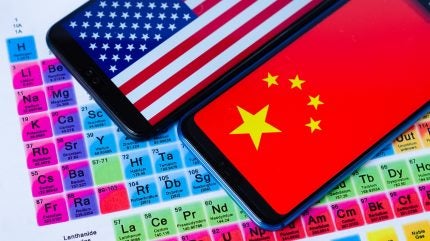
China has broadened its export restrictions on rare earth elements by including five additional elements under the new regulations.
Furthermore, the country has implemented more stringent rules that specifically target users in the semiconductor industry.

Discover B2B Marketing That Performs
Combine business intelligence and editorial excellence to reach engaged professionals across 36 leading media platforms.
This move, announced by the Ministry of Commerce, comes as Beijing seeks to tighten its grip on the sector ahead of talks between US President Donald Trump and Chinese President Xi Jinping.
China, considered to be the largest producer of rare earths in the world, has also added several refining technologies to its control list.
Foreign producers using Chinese materials must now comply with these rules.
The announcement follows calls by US lawmakers for wider bans on exporting chipmaking equipment to China

US Tariffs are shifting - will you react or anticipate?
Don’t let policy changes catch you off guard. Stay proactive with real-time data and expert analysis.
By GlobalDataThe expanded controls, initially announced in April, caused global shortages before deals with Europe and the US alleviated the supply crunch.
“The White House and relevant agencies are closely assessing any impact from the new rules,” a White House official told Reuters.
The new restrictions precede a scheduled meeting between Trump and Xi in South Korea at the end of October.
China produces more than 90% of the world’s processed rare earths, essential in products like electric vehicles and military radars.
The Ministry of Commerce has now restricted exports of a total of 12 rare earths, adding holmium, erbium, thulium, europium and ytterbium.
Foreign companies producing certain rare earths and related magnets will need a Chinese export licence if their final product contains Chinese equipment or material, even if no Chinese companies are involved in the transaction.
These regulations mirror US rules restricting semiconductor-related exports to China.
It remains unclear how Beijing will enforce these new regulations, especially as the US, EU and others are seeking alternatives to the Chinese rare earth supply chain.
The restrictions on the five additional elements and processing equipment will take effect on 8 November.
The rules for foreign companies using Chinese rare earths equipment or material will take effect on 1 December.
Last week, Trilogy Metals, South32 and Ambler Metals signed a binding letter of intent with the US Department of War for an investment to progress exploration and development at the Upper Kobuk Mineral Projects in Alaska.
Last month, the US Department of Energy restructured its deal with Lithium Americas Corporation to take a 5% equity stake in the company and a separate 5% stake in the company’s Thacker Pass lithium project joint venture with General Motors.
These moves are part of the US Government’s strategy to secure stakes in North American critical minerals.





